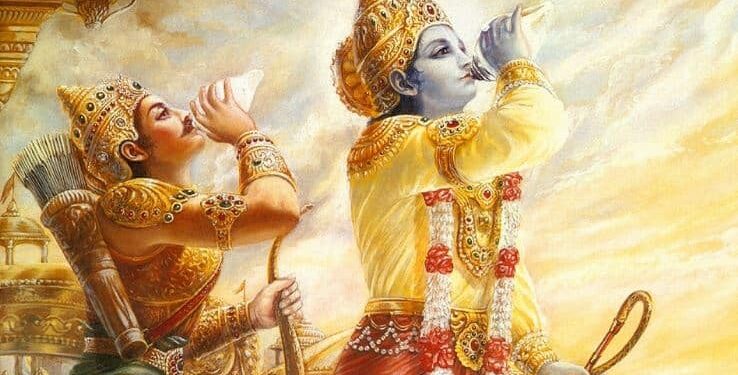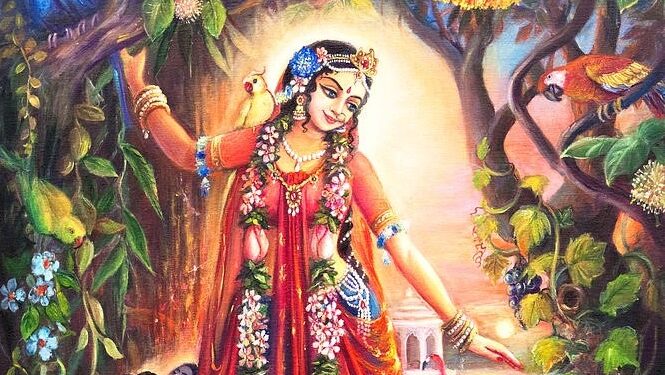TEXT 30
na ca śaknomy avasthātuṁ
bhramatīva ca me manaḥ
nimittāni ca paśyāmi
viparītāni keśava
SYNONYMS
na—nor; ca—also; śaknomi—am I able; avasthātum—to stay; bhramati—forgetting; iva—as; ca—and; me—my; manaḥ—mind; nimittāni—causes; ca—also; paśyāmi—I see; viparītāni—just the opposite; keśava—O killer of the demon Keśī (Kṛṣṇa).
TRANSLATION
I am now unable to stand here any longer. I am forgetting myself, and my mind is reeling. I see only causes of misfortune, O Kṛṣṇa, killer of the Keśī demon.
PURPORT
Due to his impatience, Arjuna was unable to stay on the battlefield, and he was forgetting himself on account of this weakness of his mind. Excessive attachment for material things puts a man in such a bewildering condition of existence. Bhayaṁ dvitīyābhiniveśataḥ syāt (SB 11.2.37): such fearfulness and loss of mental equilibrium take place in persons who are too affected by material conditions. Arjuna envisioned only painful reverses in the battlefield—he would not be happy even by gaining victory over the foe. The words nimittāni viparītāni are significant. When a man sees only frustration in his expectations, he thinks, “Why am I here?” Everyone is interested in himself and his own welfare. No one is interested in the Supreme Self. Arjuna is showing ignorance of his real self-interest by Kṛṣṇa’s will. One’s real self-interest lies in Viṣṇu, or Kṛṣṇa. The conditioned soul forgets this, and therefore suffers material pains. Arjuna thought that his victory in the battle would only be a cause of lamentation for him.
TEXT 31
na ca śreyo ‘nupaśyāmi
hatvā sva-janam āhave
na kāṅkṣe vijayaṁ kṛṣṇa
na ca rājyaṁ sukhāni ca
SYNONYMS
na—nor; ca—also; śreyaḥ—good; anupaśyāmi—do I foresee; hatvā—by killing; sva—janam—own kinsmen; āhave—in the fight; na—nor; kāṅkṣe—do I desire; vijayam—victory; kṛṣṇa—O Kṛṣṇa; na—nor; ca—also; rājyam—kingdom; sukhāni—happiness thereof; ca—also.
TRANSLATION
I do not see how any good can come from killing my own kinsmen in this battle, nor can I, my dear Kṛṣṇa, desire any subsequent victory, kingdom, or happiness.
PURPORT
Without knowing that one’s self-interest is in Viṣṇu (or Kṛṣṇa), conditioned souls are attracted by bodily relationships, hoping to be happy in such situations. In such a blind conception of life, they forget even the causes of material happiness. Arjuna appears to have even forgotten the moral codes for a kṣatriya. It is said that two kinds of men, namely the kṣatriya who dies directly in front of the battlefield under Kṛṣṇa’s personal orders and the person in the renounced order of life who is absolutely devoted to spiritual culture, are eligible to enter into the sun globe, which is so powerful and dazzling. Arjuna is reluctant even to kill his enemies, let alone his relatives. He thinks that by killing his kinsmen there would be no happiness in his life, and therefore he is not willing to fight, just as a person who does not feel hunger is not inclined to cook. He has now decided to go into the forest and live a secluded life in frustration. But as a kṣatriya, he requires a kingdom for his subsistence, because the kṣatriyas cannot engage themselves in any other occupation. But Arjuna has no kingdom. Arjuna’s sole opportunity for gaining a kingdom lies in fighting with his cousins and brothers and reclaiming the kingdom inherited from his father, which he does not like to do. Therefore he considers himself fit to go to the forest to live a secluded life of frustration.



















